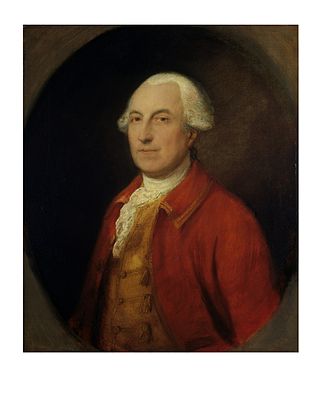Related Research Articles

George Bubb Dodington, 1st Baron Melcombe was an English Whig politician who sat in the House of Commons from 1715 to 1761.

South Dorset is a constituency represented in the House of Commons of the UK Parliament since 2010 by Richard Drax, a Conservative. The constituency was created as a consequence of the Redistribution of Seats Act 1885, although the area covered has changed since then.

Lord George Augustus Cavendish was a British nobleman, politician, and a member of the House of Cavendish.
Weymouth and Melcombe Regis was a parliamentary borough in Dorset represented in the English House of Commons, later in that of Great Britain, and finally in the Parliament of the United Kingdom. It was formed by an Act of Parliament of 1570 which amalgamated the existing boroughs of Weymouth and Melcombe Regis. Until 1832, the combined borough continued to elect the four Members of Parliament (MPs) to which its constituent parts had previously been entitled; the Great Reform Act reduced its representation to two Members, and the constituency was abolished altogether in 1885, becoming part of the new South Dorset constituency.
Denis Bond (1676–1747), of Creech Grange, Dorset, was English lawyer and Whig politician who sat in the House of Commons between 1709 and 1732, when he was expelled for financial misconduct.

Sir John Strangways of Melbury House, Melbury Sampford, Somerset, and of Abbotsbury in Dorset, was an English politician who sat in the House of Commons variously between 1614 and 1666. He supported the Royalist side in the English Civil War.

Giles Strangways of Melbury House in Somerset, was an English politician who sat in the House of Commons variously between 1640 and 1675. He fought on the Royalist side during the Civil War
John Coventry was an English politician who sat in the House of Commons from 1641 to 1642.

John Olmius, 1st Baron Waltham, of New Hall, Boreham, Essex, was a British landowner and Whig politician who sat in the House of Commons between 1737 and 1762.
George Dodington, of Horsington, Somerset, was an English politician who sat in the House of Commons between 1730 and 1754.
Maurice Ashley, of Bedford Row, Westminster, was an English Whig politician who sat in the English and British House of Commons between 1695 and 1713.

William Chaffin Grove was an English lawyer and politician who sat in the House of Commons from 1768 to 1781.

John Purling was an East India Company commander and director and a politician who sat in the House of Commons between 1770 and 1790.
Gabriel Steward was an East India Company official and politician who sat in the House of Commons between 1778 and 1790.
Edward Tucker of Weymouth, Dorset, was a British merchant and politician who sat in the House of Commons from 1727 to 1737.
Thomas Pearse, of Tower Hill, London and Witchampton, Dorset, was a British businessman and politician who sat in the House of Commons between 1722 and 1741.
William Betts of Epsom, Surrey was a British merchant, financier and Whig politician who sat in the House of Commons between 1710 and 1730
John Broadhurst was a Whig politician and the Member of Parliament (MP) for Weymouth and Melcombe Regis between October 1812 and June 1813, Hedon from December 1813 to June 1818 and Sudbury from June 1818 to March 1820.
Robert Myddelton was a Welsh politician who served as MP for Weymouth and Melcombe Regis and the City of London in the Parliament of England.
Warren Lisle was an English customs officer, active against smugglers. He was mayor of Lyme Regis in 1751, 1754 and 1763, and, near the end of his life, Member of Parliament for Weymouth and Melcombe Regis.
References
- 1 2 3 "TUCKER, John (d.I779), of Weymouth, Dorset". History of Parliament Online (1715-1754). Retrieved 23 September 2017.
- ↑ "TUCKER, John (d.I779), of Weymouth, Dorset". History of Parliament Online (1754-1790). Retrieved 23 September 2017.